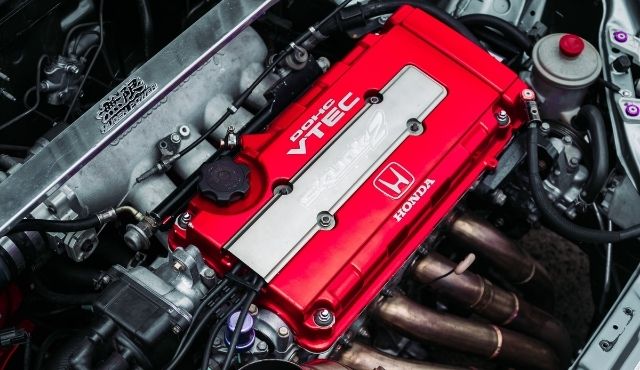It’s no secret that car problems are inconvenient. For many drivers, the worst-case scenario is finding themselves with a blown engine. Is it possible to fix your engine problems or should you buy a new car instead? Is it worthwhile to replace your engine? Well, it is.
Honda Civic is a model of car that is produced and sold by Honda. The Honda Civic has been in production for nearly 40 years, with the first model year being in 1972. It is a popular car all over the world.
The high cost of the Honda Civic engine replacement deters buyers from purchasing certain model years, despite the cars’ safety awards, performance features, long production run, and popularity among owners.
Honda Civic engine replacement costs will be discussed in this article. With no further ado, let’s get this started!
Types of Honda Civic Engines

First-generation
A four-cylinder water-cooled engine powered the first-generation Honda Civic, which was introduced in 1972. Because the engine could run on either leaded or unleaded gas, car owners had more options when it came to where they could fill up their tank, lowering the risk of using the wrong type of gasoline or damaging their vehicle.
The engine horsepower, acceleration, and performance qualities of the Honda Civic’s second generation were improved. Engines with the CVCC design were now used in all Honda Civic cars. The lean-burn swirl technology was the third valve, and it burned the fuel in the internal combustion engine with excess air.
Second generation
The base engine in the second generation produced 55 horsepower, with a 67-horsepower option. While the swirl technology improved performance, it also resulted in new mechanisms and the possibility of a higher Honda Civic engine replacement cost.
Third generation
The four-cylinder D series engine debuted in the third generation, which debuted in 1983. A 1.5-liter CVCC engine with 76 horsepower and a 1.6-liter DOHC ZC engine with 128 horsepower were both available in this lineup. Si models with a fuel-injected SOHC 12-valve engine were also introduced.
Fuel-injected engines that use a camshaft position in the cylinder head instead of a combustion chamber cause new problems and may necessitate a costly replacement of the Honda Civic engine.
Fourth generation
An inline 4-cylinder DOHC VTEC engine from Honda’s B16A family that has been used since 1988 has been used in the fourth-generation Honda Civic. The B-series, which debuted at the same time as the D-series, was designed to improve performance.
Fifth and sixth generations
The 1.6-liter SOHC and DOHC engines were available in the fifth and sixth generations, with the 1.8-liter DOHC engine only available in liftback and estate body styles.
The Honda K-Series engine, which was introduced in the seventh generation, increased power and acceleration on some trim levels. This is a four-cylinder four-stroke automobile engine with roller rockers to reduce friction and increase acceleration.
Others
This was the case for all three of the subsequent models as far as the engine or performance qualities were concerned. The high cost of replacing the Honda Civic engine today may deter some buyers. For some, the improved performance may be worth the extra cost.
Honda Civic Engine Replacement Cost

The cost of replacing a Honda Civic engine ranges from $3,500 to $4,500, depending on where you live and the cost of labor in your area. If you hire a professional to do the job, the cost could be as much as $6,000.
In this blog post, we’ll estimate the cost of replacing the engine in a 2022 Honda Civic. You must keep in mind that these are just estimates and may vary depending on your specific circumstances.
The Honda Civic’s eleventh generation was unveiled in December 2021 as the most recent Honda model. It is built on a brand-new platform and comes with three new powertrain options, including a hybrid. With a fastback roofline and aggressive front fascia, the design is more sporty than previous models.
The base engine is a 2.0-liter four-cylinder with 158 horsepower and 138 pound-feet of torque. A 1.5-liter turbocharged four-cylinder engine with 180 horsepower and 162 pound-feet of torque is also available.
The top-of-the-line powertrain is a 2.0-liter turbocharged four-cylinder with 201 horsepower and 190 pound-feet of torque. A continuously variable transmission is available with all engines.
The hybrid powertrain combines a 2.0-liter four-cylinder engine with two electric motors to produce 212 horsepower total. The hybrid model’s battery pack is hidden beneath the rear seat, and the hybrid model’s electric-only range is estimated to be 47 miles.
Automated emergency braking is standard, as is adaptive cruise control and lane-keeping assist. As an option, the Honda Sensing suite adds traffic sign recognition, road departure mitigation, and a collision mitigation braking system.
The Honda Civic’s eleventh generation is one of the most technologically advanced vehicles in its class. It has a standard 7-inch touchscreen infotainment system that supports Apple CarPlay and Android Auto.
So what does the Honda Civic engine replacement cost?
The base model of the 11th generation Honda Civic costs $20,650, which is about $200 more than the previous generation. The Touring trim level starts at $28,050. The price of the hybrid model begins at $26,390.
The cost of replacing the engine in a Honda Civic varies depending on which generation you have.
Engine replacement for the 11th generation Honda Civic costs between $3,500 and $4,500. These prices do not include labor costs and are for a complete engine replacement.
How much does it cost to replace an engine professionally?
If you decide to replace your Honda Civic engine yourself, you won’t have to spend a lot of money because the only expenses you’ll have are the cost of tools if you don’t already have them and the cost of a new engine for your vehicle.
If you hire a professional mechanic to replace your Honda Civic engine, the fee will include the mechanic’s service fee as well as the cost of purchasing a new engine. You can expect to spend between $5,000 and $6,000 on this project.
Honda Civic model years that were the wrong way around
Honda Civic engine replacement costs can vary widely depending on the model year, so it’s important to know which years of the Honda Civic were problematic and had numerous problems in order to figure out why. 2001, 2006, 2007, 2008, and 2016 are the production years with the most serious and widespread issues.
Transmission failure in the 2001 and 2002 Honda Civic cars, as well as a cracked engine causing performance issues in the 2006 Honda Civic, are the top three concerns across every model year.
Steps to Replace Honda Civic Engine

1. Make your workspace ready
To begin, double-check that you have all of the necessary tools and parts to replace your Honda Civic engine. You’ll need to find a suitable location to work on your car once you’ve gathered everything. It should be large enough for you to move around comfortably and store all of your tools. Because working on engines can produce a lot of fumes, you’ll also want to make sure it’s well ventilated.
2. Remove the battery from the vehicle
The next step is to double-check that the battery terminals are properly disconnected. This is for your safety, so you don’t get shocked or hurt while working on the engine. You may need to raise the car with the jack wheel first to gain access to the underside of the vehicle when removing the engine.
3. Exhaust manifold clean up
To get to the Honda Civic engine, you must first remove the exhaust manifold and all battery hoses. This includes the transmission fluid, coolant, and oil. To do so, look for and remove the drain plugs. The fluids will begin to drain once they are removed.
Make sure they’re caught in a suitable container so you can properly dispose of them later. You can proceed to the next step once all of the fluids have been drained. This, however, is dependent on how you want to remove the engine. It’s crucial to free the exhaust manifold if you want to exit through the upper side.
The upper radiator hose must be cleared, and the fluid oil must be drained.
4. Remove the drivetrain and loosen up the power steering pump
The power steering pump, like the AC compressor pump, is located directly above the engine and should be removed with the wrench to make room.
The drivetrain from your car must now be removed. The transmission, axles, and driveshaft are all removed during this process. You’ll need to loosen and remove the bolts that hold these components in place in order to do this. You can now carefully remove the components from your car after they have been removed.
5. Remove the fuel rail wire harness
You’ll be able to remove the harness rail by pressing the two clips together. You’ll have access to the engine transmission after removing it, so use the ratchet set to remove the bolt that’s holding it in place.
6. Jack up the car
This will allow the engine to be completely removed. The engine can now be removed after you’ve disconnected all of the wires, harness, and engine transmission. It’s possible that you’ll need help to completely remove the engine.
7. Engine removal
After that, you’ll need to take your car’s engine out. To do so, you’ll need to unplug all of the electrical connections and hoses. You can now remove the bolts holding the engine in place once they have been disconnected. You can carefully lift the engine out of your car after the bolts have been removed.
8. Put the new engine in place
Installing the new engine in your car is the next step. To do so, connect all of the necessary electrical and hose connections. The engine can then be bolted into place once they’re connected. To prevent the engine from coming loose while driving, make sure the bolts are tight.
9. Set up the transmission
The drivetrain must now be reinstalled in the vehicle. The transmission, axles, and driveshaft are all part of this process. These components must be bolted back into place to accomplish this. You can now fill your car with the fluids you drained earlier after they’ve been bolted in.
Frequently Asked Questions
Is it true that having your engine replaced has an impact on value?
Because a new engine will not run as smoothly as the original engine, the new engine will be more valuable than the original engine due to its improved performance.
Is changing engines worth it?
Because the engine is small, the car’s low weight and sport-style brakes and suspension can be used to significantly improve performance after the engine is replaced. This problem isn’t addressed in all types of vehicles. You must have a minimum level of performance to upgrade.
Is it more cost-effective to replace an engine?
Most passenger car engines can be replaced for between $2,000 and $3,000, while new engines can cost anywhere from $4,000 to $6,000. You can save a lot of money in the long run by catching and repairing engine problems as soon as possible.
What is the manufacturer’s warranty on the Honda Civic?
You’ll get a 3-year/36,000-mile basic warranty and a 5-year/60,000-mile powertrain warranty when you drive your new Honda Civic off the lot (whichever comes first).
This level of coverage is fairly common among automakers, but it is on the lower end of the warranty spectrum. Check your vehicle’s warranty status, service history, and more on the Honda website by entering the VIN number. If you can’t find your VIN number, you’ll have to contact or visit your local dealer to learn about your vehicle’s factory warranty.
Conclusion
There is a huge difference in the cost of a Honda Civic engine replacement, depending on which model year you are looking at. The Honda Civic was a bad buy from model years 2006-2009 because of its high price, lack of dependability, and safety concerns.
Owners, however, found this car to be a high-powered, safe, and reliable option once Honda fixed the engine issues and began offering additional engine options for various trim levels.
